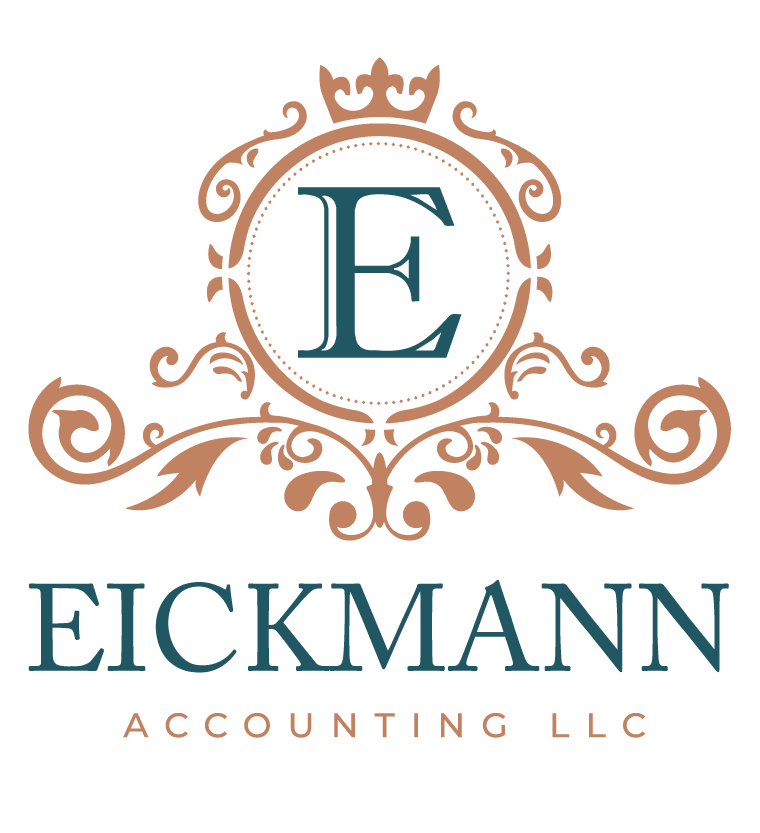Beyond the Shoebox: 5 Essential Bookkeeping Habits for Small Business Success
As a small business owner, you wear many hats: innovator, marketer, salesperson, and often, the chief bookkeeper. It’s easy for financial record-keeping to slide down the priority list amidst daily operations. However, treating your bookkeeping as an afterthought can lead to missed opportunities, tax headaches, and a murky view of your business’s true health.
At Eickmann Accounting LLC, we know that good bookkeeping is the backbone of sustainable growth. It’s not just about preparing for tax season; it’s about making informed decisions year-round. Ditch the “shoebox” method and cultivate these five essential bookkeeping habits for lasting success.
- Separate Business and Personal Finances (No Exceptions!)
This is the golden rule of small business bookkeeping, yet it’s often overlooked by new entrepreneurs. Mixing your business and personal expenses is a fast track to confusion, inaccuracy, and potential red flags with the IRS.
The Habit: Open dedicated bank accounts and credit cards solely for your business transactions. This means all business income goes into the business account, and all business expenses are paid from it.
The Benefit: Clear separation simplifies tracking, makes financial reporting straightforward, and significantly streamlines tax preparation. It also protects your personal assets if your business is structured as an LLC or corporation.
Actionable Tip: Make this your first step. Even if you’re a sole proprietor, a separate account creates a clean audit trail and helps you understand your business’s true profitability.
- Choose the Right Accounting Software and Use It
While spreadsheets can work for very tiny operations, proper accounting software is an invaluable tool for efficiency and accuracy as your business grows.
The Habit: Research and select accounting software (like QuickBooks Online, Xero, or FreshBooks) that fits your business size, industry, and budget. Then, commit to using it consistently.
The Benefit: Modern accounting software automates data entry, categorizes transactions, generates essential financial reports (like Profit & Loss statements and Balance Sheets), and often integrates directly with your bank accounts and payment processors.
Actionable Tip: Don’t just buy it – learn it! Many software providers offer free tutorials, or consider investing in professional setup and training to ensure you’re utilizing its full potential.
- Track Every Dollar In and Out (Regularly!)
The more frequently you record your transactions, the less daunting the task becomes. Waiting until the end of the month (or worse, the quarter or year) creates a monumental backlog.
The Habit: Dedicate a specific time each week (or even daily for high-volume businesses) to record all income and expenses. This includes sales, invoices paid, supplier payments, payroll, and every other financial movement.
The Benefit: Consistent tracking ensures you have a real-time pulse on your cash flow, helps you identify spending patterns, and makes it incredibly easy to pull accurate reports when needed for decision-making or tax purposes.
Actionable Tip: Implement a system for receipts: digital photos stored in cloud folders, an expense tracking app, or a simple physical file. Make sure every transaction has a corresponding record.
- Reconcile Bank Accounts Monthly
Bank reconciliation is the process of comparing your internal bookkeeping records with your bank statements to ensure they match.
The Habit: Set aside time each month to reconcile all your business bank accounts, credit card statements, and loan accounts.
The Benefit: This critical step catches errors (both yours and the bank’s), identifies missing transactions, detects potential fraud, and confirms the accuracy of your financial records. It’s a vital check-and-balance for your bookkeeping system.
Actionable Tip: Use the reconciliation feature within your accounting software. It guides you through the process and flags discrepancies, making it much simpler than manual comparison.
- Understand Your Financial Statements
Your financial statements – primarily the Profit & Loss (Income Statement) and the Balance Sheet – are more than just numbers for your accountant. They tell the story of your business’s health.
The Habit: Make it a point to review your Profit & Loss and Balance Sheet regularly (e.g., monthly or quarterly). Learn what the key figures mean for your business’s performance.
The Benefit: Understanding these reports empowers you to identify trends, pinpoint areas of strength or weakness, make informed decisions about pricing, expenses, investments, and overall strategy.
Actionable Tip: Don’t hesitate to ask your accountant to walk you through your reports. They can help you interpret the data and turn numbers into actionable insights for your business’s future.
Implementing these five essential bookkeeping habits will transform your financial management from a daunting chore into a powerful tool for growth. Accurate and organized records aren’t just for tax compliance; they’re your roadmap to smarter decisions and sustained business success.
Feeling overwhelmed by your books? Eickmann Accounting LLC offers comprehensive bookkeeping and business advisory services designed to help your business thrive. Let’s talk about how we can support your financial clarity!






Leave a Reply
Want to join the discussion?Feel free to contribute!